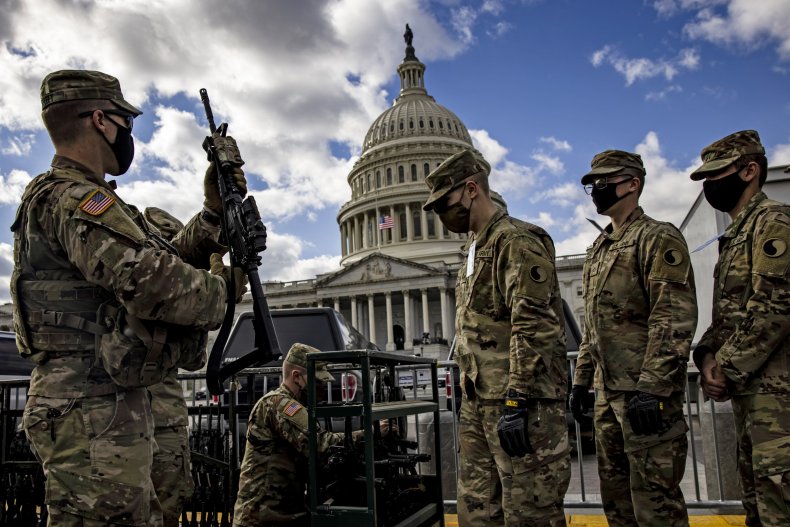Pentagon in Dark About Troop Extremism As Report Shows Far-Right Recruiting
The Pentagon has said it still does not know the scale of extremism in the ranks, as officials conduct a military-wide investigation into belief in far-right and other ideologies among troops.
Pentagon spokesperson John Kirby told reporters on Tuesday that the probe was ongoing and defense officials could not yet give any guide on how big the extremism problem was.
But the Pentagon has also released a report, requested by Congress under the administration of Donald Trump, that has found far-right extremist groups are actively trying to recruit serving troops and sending their members into the military to gain valuable training and combat experience.
The Associated Press said the report, published on Tuesday, did not assess whether the extremism problem in the military was getting worse, but included multiple examples of current and former military members affiliating with extremist groups and committing related crimes.
"Military members are highly prized by these groups as they bring legitimacy to their causes and enhance their ability to carry out attacks," the report said, according to the AP. "In addition to potential violence, white supremacy and white nationalism pose a threat to the good order and discipline within the military."
The Pentagon is in the midst of a 60-day stand down ordered by Secretary of Defense Lloyd Austin last month, in which all services have been told to review the danger of extremism within the ranks. Austin said the order would help officials root out "racists and extremists."
The military is coming under particular scrutiny given the disproportionately high number of veterans and serving military members involved in the January 6 storming of the U.S. Capitol by a far-right mob.
"Clearly, the events of January 6th and the presence of some veterans in that crowd has certainly got everybody's attention here," Kirby told reporters on Tuesday.
"But even before that, in the previous administration, there were valid concerns about extremism in the military," Kirby added, pointing to the report.
"Extremism is a growing concern inside the ranks," Kirby said. "Now, how big is it? We don't know."
Austin told reporters last month that he expects the number of extremists "to be small," but admitted that it will "probably be a little bit larger than most of us would guess." The secretary warned that even a small number of extremists can have an "outsized impact."
Kirby echoed Austin's comments, saying the scale of the problem would be "larger than we probably expect them to be, and perhaps less than the headlines might suggest, but we just don't know."
Observers have long warned that a significant number of neo-Nazis and white supremacists are enlisted in the military, attracted to the forces for training and experience, and by their nationalistic and violent ideologies.
Some groups, such as the far-right anti-government Oath Keepers militia, recruit their members almost solely from former and current military or law enforcement personnel. At least nine members of the Oath Keepers have been charged in relation to the January 6 riots.
"It's not like we haven't been aware that this is an issue, but I think there's renewed concerns given what has happened in the last few months," Kirby said. "It's a problem we still don't have a firm grip on and firm handle on, and [Secretary Austin] wants to do that."
Asked about individual ideologies and groups of concern, Kirby gave a broad response. "If you looked at the things that the secretary said, it's about an extremist ideology and that can take many forms," he said.
"So it's not just about white supremacy, but about extremist ideologies, including of a criminal nature, you know, gangs and that kind of thing," Kirby said. "We're not trying to be too proscriptive in what we're defining here. But identifying it is a challenge and we're trying to get our arms around that."


